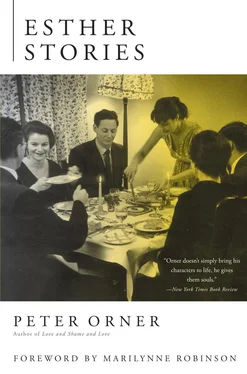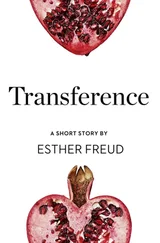But as much as Lena Gold’s story has fascinated me for all these years — the roller coaster element of it, the intrigue of such crimes and domestic upheavals amid the square-lawned primness of my suburban northwest Chicago — when I think back on it, I mostly think of Don, the real estate broker. He was the fawn in the headlights. He was the one the botched attempt really did end up killing. Inadvertently, true. And yes, not literally. My mom tells me he’s doing just fine these days, still living above his office. Oh, you know Don. He’s a trouper’s trouper. But I think I know differently. Something broke in that man, something I doubt even all this time has been able to heal. I’ve had enough of my own blind sides to know that while it may be easy to clear away the wreckage, it’s much harder to stop fingering your scars.
I last saw Don in the winter of ’85, a year after Lena Gold’s early release. I was sitting Theodore. Fran and Mrs. Gold were at the opera. It was a Friday night in February, around 10:30. Theodore was already asleep when the front doorbell rang, which was weird. Fran and Mrs. Gold’s house on Cedar Valley Road was what my mom called a “forget knocking, barge in the back door” kind of house. A house where you didn’t wipe your feet, and where you simply merged into the chaos: Mrs. Gold’s cooking spatter, Fran’s case files all over the place, Theodore’s play shoes, Mrs. Gold’s salsa music. Only the Jews for Jesus rang the front bell, and they were welcome, too. But that night it was late and silent, and I turned on the outside light and opened the front door to a pale, nervous, jacketless man. In the brightness I could see that he’d cut himself shaving. His chin was bleeding.
“Mr. Swanner?”
“Evening, Beth.”
“Hi.” I rubbed my sweater arms. It couldn’t have been more than ten degrees, and Don’s shifting feet creaked in the ancient hard-packed snow.
“I’d like to take a walk around, if you don’t mind. Just for old times.”
I continued to stare at him. His quick small breaths were like puttering exhaust in the cold. I mentioned before that Don was courtly. A beautiful man, as far as men go, I overheard Fran once tell my mother. But this was post — John Wayne Gacy Chicago. I thought, What if this famously mild-mannered ex-husband turned spurned lover suddenly, finally, goes berserk and tries to strangle Theodore — the love child of his wife’s ex-con live-in girlfriend — to death in his angelic sleep? Gacy the clown juggled at birthday parties. Gacy the politician shook hands with Rosalynn Carter. The police found twenty-seven bodies in his crawl space. Lena Gold was a decorated Brownie troop leader at the time of her arrest. I was fifteen and one-third, and I was the babysitter. Don gazed at me with beaten, patient eyes as I stood in the front hall he used to sweep every Sunday.
“I’m not sure I can let you in,” I said.
“Excuse me?”
“I’m not sure if it’s okay.”
Don examined the way I was squinting at him. He saw that I had the potential to be afraid of him, and this made him laugh. “I know you’re just doing your job, Beth. That you’ve got a responsibility.” He held up his right palm. “I absolutely promise not to run off with the silver, and God strike me dead this moment if I would ever hurt a child.” His eyes pucked out when he said that last part, and he wasn’t laughing anymore.
I stepped aside. He thanked me and offered his hand. We shook as if we’d made some kind of deal, but I wasn’t sure what we were agreeing to. Though Don was at least six feet tall, his hand was so small and sweaty, so fightless, so unlike Lena Gold’s, that I wondered if Fran hadn’t cast him out because of his puny hands. I hovered behind him as he skulked around the house with his hands behind his back, as if he were taking a tour at the Art Institute or, more likely, some frighteningly realistic exhibition dedicated to his previous life. He paused at the bulbous umbrella holder in the back hall. He nudged the faded green Oriental rug back into position. He reset the grandfather clock to match the time on his own watch. After trailing him for ten minutes, I went back to the den. I turned the sound down so I could listen to him creep around the kitchen. I heard him open the refrigerator, as if a look at Lena’s strange and healthy foods (tofu, eight varieties of beets) would somehow explain what had gone wrong. For another ten minutes I heard nothing. I imagined him in a chair at the kitchen table, silently weeping with his head in his hands, antagonized by memories of Fran, pantless and beckoning, clad only in one of his dress shirts. Then, from the living room, I heard the loud swipe of a kitchen-size match. I was certain that he’d at last gone over the edge and had poured gasoline all over the furniture and that Theodore and I were done for, as good as charred. When I skidded into the living room in my socks, Don was squatting before the fireplace, feeding kindling to budding flames. He twisted around and looked at me.
“Thought I’d warm the place up a bit. Okay with you?”
“I guess so.”
He rubbed his hands together. “It’s been so long since I made a fire. I used to make—” He stopped and clapped. “Hey. How about a game of chess? How about it, Beth?” His face was redder than it had been at the door, and his voice was suddenly too perky, as though he was trying desperately to be chipper, to be light. He went to the cabinet above the stereo. “We used to keep the chess set right in here, and maybe—” He yanked a cardboard box, turned around, and shuffled the plastic game pieces at me.
“Sorry, I don’t play.”
He turned back to the cabinet. “Scrabble? Now, there’s a game. I know we’ve got a Scrabble board somewhere in here.” He started dropping game boxes on the floor. Chutes and Ladders. Connect-Four. Gnip-Gnop. Othello. Life. Battleship. Then he laughed. “Christ, Parcheesi! Whenever my brother Burt drove up from Louisville — wait, ah ha!” He held up the Scrabble game in triumph. His goofy pained face was like a child’s, more like Theodore’s when he pressed chewed fruit into my hands than an adult with a job. He unfolded the board on the coffee table.
“I’ve got to call a friend,” I said.
Don set the box on the carpet and looked at the fire. “Of course,” he said. “I understand.”
“It’s kind of an important call.”
“Right.” He sniffed and checked his watch. “Anyway, I’ll just sit here awhile.”
“Maybe I’ll play later,” I said, to give him hope. I walked backward and watched him pull letters out of the box, slowly, one at a time. In the den I picked up the phone and pretended to call a guy from school. His name was Evan Magocini, and he’d never so much as wiped his snot in my direction in four years. He had blond bristly hair like the end of a brand-new broom. I despised him and lusted him.
“Hello, Evan,” I said, loud enough for Don to hear. “I want you to know I despise you and everything you stand for.” I paused and waited for Evan to respond as the operator told me to hang up and please try again. “Another chance!” I shouted. “You want me to give you another chance? What is this, Wheel of Fortune ? Am I supposed to sit around and wait for you to get done foaming at the mouth over Luana Palandri?” I paused as the phone began to whine a tone like our school tornado drill. “No, Evan,” I screamed, forgetting about Theodore sleeping upstairs. “No! Never!” Then I rammed the phone into the cradle. The house was still. Don didn’t come running. He had his own misery and he didn’t want to join mine.
But God, did I want him to. Because even though he tried to laugh, he didn’t pretend. Sorrow was in his hands, in his eyes, in the blood on his chin, and I wanted to touch it. I wanted to do more than touch it. It would have been my first time, and I thought how right that would be. Another legacy of Lena Gold. She’d probably have approved. A little love for two who needed it. And I knew he would be gentle. Those teeny fingers unbuttoning my jeans, the same slow way he was picking up those letters, poking my buttons through the penny slits, one after another. But what if he refused me? What if after I went to him and nuzzled close and pushed the Scrabble board out of the way with my knee, he only smiled graciously and said, “Well no, Beth. I couldn’t.” I sat on that blue velour couch and listened to the cackle and spit of the fire in the living room and could not move. I sat and waited in front of the silent television for Don to do something, anything, to acknowledge me again. To say, Beth. To say, Beth, help me. To say, Beth, I want you to help me. I watched the silent television.
Читать дальше












